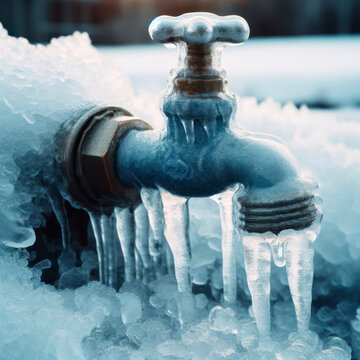Ways to Prevent Frozen Plumbing in Cold Weather: Expert Guidance
Ways to Prevent Frozen Plumbing in Cold Weather: Expert Guidance
Blog Article
This post below relating to 6 Ways to Prevent Frozen Pipes is exceptionally remarkable. You should read it.

Winter can wreak havoc on your pipes, particularly by freezing pipelines. Right here's just how to prevent it from taking place and what to do if it does.
Introduction
As temperature levels decline, the risk of icy pipelines increases, possibly bring about costly repair services and water damages. Understanding exactly how to stop frozen pipes is vital for house owners in cold environments.
Prevention Tips
Insulating prone pipes
Cover pipelines in insulation sleeves or use warmth tape to protect them from freezing temperatures. Concentrate on pipelines in unheated or external locations of the home.
Heating strategies
Keep interior areas properly warmed, specifically areas with pipes. Open up closet doors to permit warm air to circulate around pipes under sinks.
How to determine frozen pipes
Search for decreased water flow from faucets, unusual smells or sounds from pipelines, and visible frost on subjected pipes.
Long-Term Solutions
Architectural adjustments
Consider rerouting pipelines far from exterior walls or unheated locations. Include additional insulation to attics, cellars, and crawl spaces.
Upgrading insulation
Invest in high-quality insulation for pipelines, attics, and wall surfaces. Appropriate insulation helps keep constant temperatures and minimizes the risk of icy pipes.
Shielding Outside Pipes
Garden pipes and exterior faucets
Detach and drain pipes yard hoses before wintertime. Mount frost-proof faucets or cover exterior faucets with insulated caps.
Comprehending Frozen Pipes
What triggers pipelines to ice up?
Pipelines ice up when subjected to temperatures listed below 32 ° F (0 ° C) for prolonged periods. As water inside the pipelines ices up, it increases, taxing the pipe walls and possibly creating them to burst.
Risks and damages
Frozen pipelines can bring about supply of water interruptions, residential or commercial property damage, and costly repair services. Burst pipes can flood homes and cause extensive structural damage.
Signs of Frozen Pipes
Identifying frozen pipes early can prevent them from bursting.
What to Do If Your Pipelines Freeze
Immediate activities to take
If you believe icy pipes, keep faucets open to alleviate stress as the ice melts. Use a hairdryer or towels taken in hot water to thaw pipelines slowly.
Verdict
Stopping frozen pipelines requires aggressive measures and fast responses. By recognizing the causes, indications, and preventive measures, house owners can protect their plumbing throughout winter.
Helpful Tips to Prevent Frozen Pipes this Winter
UNDERSTANDING THE BASICS: WHY PIPES FREEZE AND WHY IT’S A PROBLEM
Water freezing inside pipes is common during the winter months, but understanding why pipes freeze, and the potential problems it can cause is crucial in preventing such incidents. This section will delve into the basics of why pipes freeze and the associated problems that may arise.
THE SCIENCE BEHIND FROZEN PIPES
When water reaches freezing temperatures, it undergoes a physical transformation and solidifies into ice. This expansion of water as it freezes is the primary reason pipes can burst. As the water inside the pipe freezes, it expands, creating immense pressure on the walls. If the pressure becomes too great, the pipe can crack or rupture, leading to leaks and water damage.
FACTORS THAT CONTRIBUTE TO PIPE FREEZING
Low Temperatures: Extremely cold weather, especially below freezing, increases the risk of pipes freezing. Uninsulated or Poorly Insulated Pipes: Pipes located in unheated areas, such as basements, crawl spaces, or attics, are more prone to freezing. Insufficient insulation or lack of insulation altogether exacerbates the problem. Exterior Wall Exposure: Pipes running along exterior walls are susceptible to freezing as they encounter colder temperatures outside. Lack of Heating or Temperature Regulation: Inadequate heating or inconsistent temperature control in your home can contribute to frozen pipes. PROBLEMS CAUSED BY FROZEN PIPES
- Pipe Bursting: As mentioned earlier, the expansion of water as it freezes can cause pipes to burst, resulting in significant water damage.
- Water Damage: When pipes burst, it can lead to flooding and water damage to your property, including walls, ceilings, flooring, and personal belongings.
- Structural Damage: Prolonged exposure to water from burst pipes can compromise the structural integrity of your home, leading to costly repairs.
- Mold and Mildew Growth: Excess moisture from water damage can create a favorable environment for mold and mildew growth, posing health risks to occupants.
- Disrupted Water Supply: Frozen pipes can also result in a complete or partial loss of water supply until the issue is resolved.
WHY CERTAIN PIPES ARE MORE PRONE TO FREEZING
- Location: Pipes located in unheated or poorly insulated areas, such as basements, crawl spaces, attics, or exterior walls, are at higher risk of freezing.
- Exterior Pipes: Outdoor pipes, such as those used for irrigation or exposed plumbing, are particularly vulnerable to freezing as they are directly exposed to the elements.
- Supply Lines: Pipes that carry water from the main water supply into your home, including the main water line, are critical to protect as freezing in these lines can affect your entire plumbing system.
- Underground Pipes: Pipes buried underground, such as those connected to sprinkler systems or outdoor faucets, can be susceptible to freezing if not properly insulated.
https://busybusy.com/blog/helpful-tips-to-prevent-frozen-pipes-this-winter/

Hopefully you liked our section on How to prepare your home plumbing for winter weather. Thanks so much for finding the time to read our content. Be sure to set aside a second to share this article if you enjoyed reading it. I value reading our article about Prevent Frozen Pipes .
Get A Free Quote Report this page